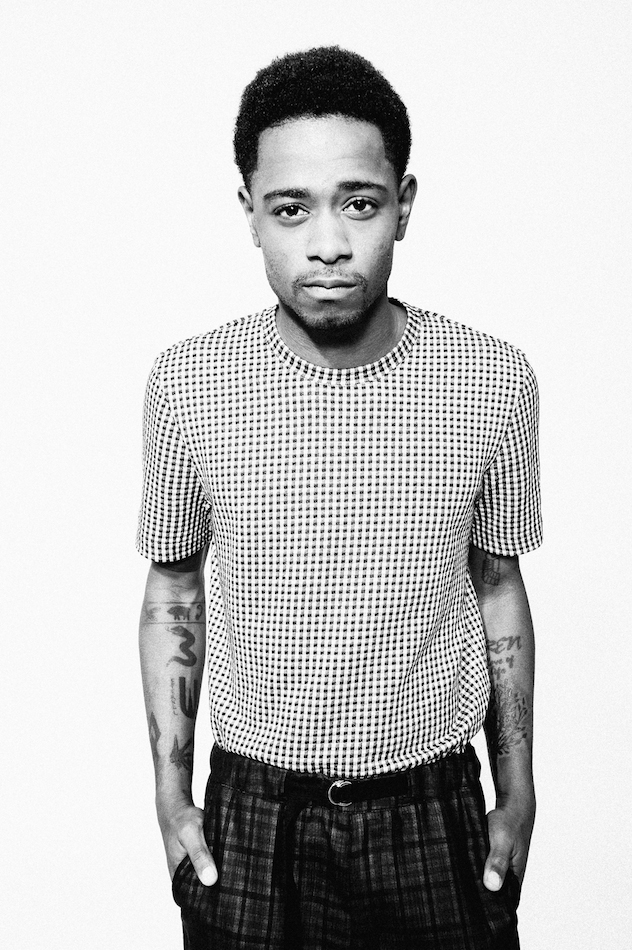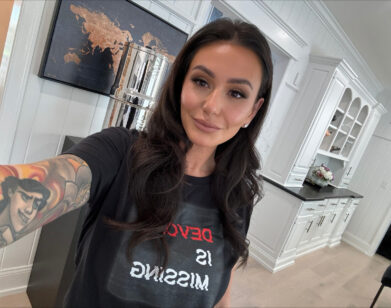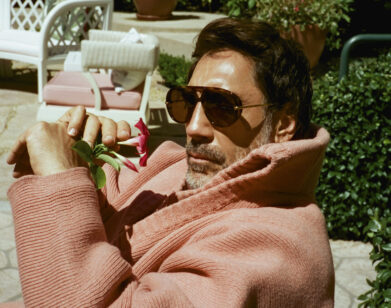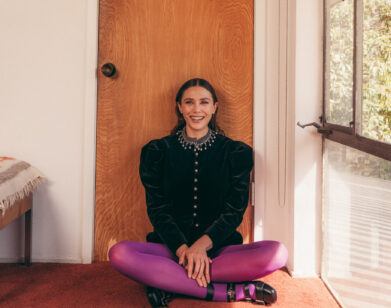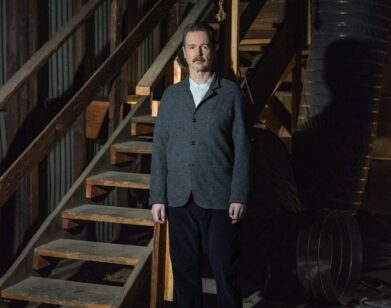The Sincere Multi-Hyphenate
ABOVE: KEITH STANFIELD IN LOS ANGELES, DECEMBER 2014. PHOTOGRAPHY BY CARA ROBBINS. STYLING BY SEAN KNIGHT. GROOMING: BLONDIE FOR EXCLUSIVE ARTISTS.
When we first met actor and rapper Keith Stanfield in August 2013, he was a fresh face, just finishing his feature film debut alongside Brie Larson, John Gallagher Jr., Rami Maleck, and Kaitlyn Dever in Short Term 12. Now, hardly a year later, Stanfield has established himself under his musical moniker MOORS—his video for “Asphyxiated” was nominated for a U.K. Music Video Award—and in Hollywood, with his supporting role as Civil Rights activist Jimmie Lee Jackson in Ava DuVernay‘s Selma.
Although Selma is categorized as a biopic of Martin Luther King Jr. (David Oyelowo), it feels far removed from other films of the same categorization. Rather than focusing on MLK’s influence or entire life, Selma chronicles a three-month span, tracing the marches of Selma, Alabama following the passing and blatant disregard of the Civil Rights Act of 1964. Emotionally charged and infused with wide-angle shots and sun-baked montages, DuVernay and her all-star cast—the film also features Oprah, Tim Roth, Cuba Gooding Jr., and Martin Sheen—tell a powerful story that resonates within the viewer, especially given the recent political and social protests, movements, and actions.
Next year, Stanfield’s name will be one to watch, surfacing with even more high-profile roles, such as Snoop Dogg in the much-anticipated Straight Outta Compton and as Bug in Rick Famuyiwa’s Dope with Zoë Kravitz, Forest Whitaker, and Blake Anderson.
A few days before Selma’s lilmited release on December 25, we spoke with Stanfield over the phone.
KEITH STANFIELD: What’s up duuuude! [laughs]
EMILY MCDERMOTT: Hey, Keith. [laughs] So I saw Selma and it’s incredibly emotional. I wanted to talk a little about the process–working with Ava DuVernay and such a strong cast–and what that was like for you.
STANFIELD: Well, I met Ms. DuVernay at the [Film Independent] Spirit Awards for Short Term 12. She was a cute, little young lady, and came up to me and said, ” I really enjoyed your performance and I’m a fan of what you’ve done.” I’m like, “Well, thank you. Would you like to take a photo?” Then we take a photo and chit-chat for a bit, and then she runs off her way and I run off my way.
Then I get this audition for Selma a couple months later. I walk in the audition room and pow! She’s sitting right there. I’m just like, “What the hell! Why are you here?” She’s like, “I’m directing this.” I was surprised to see her there, but we talked a little and then I did a reading. After the reading we went off and talked about the role and how much it means to me based on my own personal life and everything that’s going on surrounding relations between the quote-un-quote Africa American and law enforcement in America. After a couple conversations about that, I found out that I’m invited to be a part of this movie.
I had no clue what scale it would be until I went on set. Then I saw how everything was working, and I was like, “This is fucking amazing.” I kind of channeled into the spiritual movement that was rolling on set; there seemed to be this devotion toward telling a real story that everyone was invested in and I got to be a part of it. I was very grateful for that and channeled into whatever frequency everyone else was in. I tried to my best to depict what these characters represented in real life.
MCDERMOTT: What does the part mean to you looking at it both historically and in contemporary context?
STANFIELD: You need to do nothing else but look on at what’s going on around you in order to answer that question. For me, I think it speaks volumes to what is occurring right now. I don’t think it gives any immediate answers for ways to approach these questions, because of course now it’s a bit different than it was back then. Although, it seems to be by and large the same thing, just different ways that we go about responding and acting with instances on social media and things like that. It’s a lot different, but there is a lot of similarity. I think it’s up to individuals to find within themselves what they think the proper way of addressing these issues are.
For me, seeing this movie changed my perception [of] the way in which to respond. A lot of times people are aroused and begin to riot and blow shit up. They become so destructive, which initially, probably would’ve been the way I would have responded. But after seeing this movie, I think there are different ways to address these situations.I think the main way of doing that is through [self]-reflection. Because after all, when you’re talking about an authority figure oppressing against people, it’s the people that hold that authority figure up. If you want to get free of this bondage, then we need to think about ways to free ourselves, rather than looking to the oppressors to free us. So in a nutshell, I think it’s self-reflection and figuring out ways to move to where we are amongst the power figures themselves, instead of trying to push it out to alternate sources.
MCDERMOTT: I read that when you take on a role, you sort of become the part for the entirety of the filming process, rather than getting into character while filming and then becoming yourself offset. Is that still true?
STANFIELD: For Short Term 12I decided that I wanted to remain wherever the particular energy was. I may decide I want to do that again, but I think with every character I get, there’s an approach that’s appropriate. I feel like my own job is to interpret what there is [in the film] and show that through me, sort of really channel myself through the role. If I feel I need to get into it to the point where I don’t leave it, then I will.
For Selma in particular, I didn’t feel that I needed to go all the way to the extent of being Jimmie Lee Jackson, simply because Jimmie Lee Jackson was a person that I didn’t know. I just knew that me and him share similarities, one of those being the willingness to speak, in terms of people or things or entities of power that don’t want you to speak the truth. Me and him have that in common; we speak the truth regardless. I let that part of me start revealing itself. I let those core relations show themselves. I wanted to be as genuine as possible because all those people like Jimmie Lee Jackson–me, Mike Brown, all these people–we’re all the same; we’re not much different. We’re all trying to get by, trying to live, and happened to be in a situation and in a country where that’s made a little bit more difficult, and we respond in different ways. Sometimes we respond in an emotional way; other times we respond in non-emotional ways.
This particular instance [in Selma] was one where emotions were aroused because Jimmie Lee’s family was being attacked–an older man who took care of Jimmie Lee his whole life was being attacked and thrown on the ground, his mom was being put in a chokehold. How do you respond to something like that? It’s the flight or fight response, and Jimmie chose to fight. Unfortunately because he chose to fight for what he believes in, he was shot and killed–not even really fight, just defend, just defend people who were being attacked, his family who was being attacked. I understood that and identify with that and I let that part of me come through.
MCDERMOTT: But then you have an upcoming role as Snoop Dogg, which is drastically different from this. So what is it like going between such different types of roles?
STANFIELD: The more and more I step back and look at myself from my own personal perspective–which is what I try to do, to get outside of myself and look at it–there aren’t too many things that I don’t think I am. So at the same time I was Jimmie Lee Jackson, I’m Snoop too. I like to party ‘n’ bullshit, entertain, be the center of attention, and pour champagne on naked girls. I like to do that too. [laughs] So for Snoop, I just let that part [of myself] come out. I didn’t do an extensive study of Snoop, but I tried to know as much as I could. I got the call that I was Snoop the day before I had to shoot, actually a couple hours before I had to shoot. I was told at like 2:00 pm and at 5:00 the next morning I had to be on set.
MCDERMOTT: Wow. That’s really short notice.
STANFIELD: Yeah. So I didn’t get that much time [to prepare], but in the time that I had, I didn’t sleep. I was in Snoop-mode that entire time. I was sort of familiar with him, but I found that me and him have a lot of similarities. The NWA was really a landmark moment in music, in hip-hop, so I was really happy to be around people who helped create that. A new generation may not be as familiar with it, so it was exciting to be a part of that–bring homage to people who paved the way.
MCDERMOTT: And you have your own rap project MOORS, right?
STANFIELD: Yeah, MOORS is what I’m working on right now. I’m trying to push boundaries in music with this project, but I wouldn’t be able to do that if wasn’t for Straight Outta Compton. I was really fortunate to be a part of that and work with Dr. Dre–that was fucking sick. And Ice Cube–bow!
MCDERMOTT: How did you become involved with that project?
STANFIELD: I auditioned for, like, every role in that movie. I went through a long audition process. So I go in and they set me up with these guys and we do this improv. I think that ultimately made them choose me, because I could cope with these situations. That was fun. It will be a great film, for sure.
MCDERMOTT: I know you entered into acting somewhat circumstantially. You started with commercials and then began doing film not too long ago. Did you ever think of becoming an actor when you were a kid or did it just kind of happen?
STANFIELD: [pauses] I always knew I’d be an actor. I always knew I’d at least be on a big screen somewhere. Everyone else I was watching, they were cool, but I thought that I could bring something fresh and new, even when I was really young. I didn’t really know how it was going to pan out, for sure, but I always knew that one day I would be on the big screen. I had no doubts in my mind.
MCDERMOTT: What was one of the first films or plays or performances that really captured your interest in acting?
STANFIELD: When I was little, when I was a toddler or something, I would watch Jason’s Lyrica lot. I was in love with Jada Pinkett [Smith]. I would watch like Boyz n the Hood, and fucking, The Lion King, shit like that—Disney movies. All of those movies crossed my eyes, even like Edward Scissorhands. Shit like that really had me interested in creating a story and really inspired me.
MCDERMOTT: I also read that you are inspired a lot by other people’s performances–watching them and thinking if you were in their place what you would’ve done. Can you give a few examples of people or performances you look at?
STANFIELD: The crazy thing is that I would even do that just watching commercials. It could be anyone. That little box, I felt like it was this crazy world you could go into and reach everybody. I thought that most people who I saw up there didn’t really connect with me, because they didn’t seem to be very real, especially when I watched the news or something. It seemed like they were acts. I know that’s what they’re doing, but I didn’t think it should feel that way. [laughs] So I always thought, “Man, what if there was a way to go in there and you really felt like a person was a real person?” I liked to look at it like that. I felt like if it wasn’t saturated in a lot of boring film type stuff, maybe it could be cool. Like Love Jone and stuff like that, that made me really want to be a part of it. Larenz Tate was a real inspiration, even when I was four-years-old. Of course Denzel Washington was great, is great. Tupac, especially, because he did music as well. When I was younger I really just wanted to act, but as I got older I wanted to do music. Then I was like, “I want to do both.”
MCDERMOTT: Would you say that they’re equally important to you? And that you pursue each of them with the same amount of energy?
STANFIELD: I would. I would say I like expressing myself in different ways. The way I can express myself in songs is awesome. What you can express through acting is cool too. I just want to let it all out. I like them both for different reasons, though. Music has a freedom that acting doesn’t really have, [and] acting presents a challenge that music necessarily doesn’t.
MCDERMOTT: Your music videos are very cinematic. Do you feel like you’re acting in them or do you feel like you’re yourself?
STANFIELD: I feel like it’s an extension of myself in my music. But in a certain way, acting is also an extension of myself. What I really am, I am not able to put on paper. Everything is intuitive. The real me hasn’t been seen yet and I don’t think it ever will be. I’m always changing! [laughs]
MCDERMOTT: What’s one of the biggest changes you think you’ve seen in yourself since you started acting?
STANFIELD: One of the big changes in me as a person, I think, would be…[laughs] I’m open. I’m an open book, man. I don’t ever judge anything. Before I wouldn’t listen to rock music. I was like, “Oh that shit sucks. It’s all white music.” Now, music is music. It doesn’t mean I like everything necessarily, but it means I don’t judge it. I don’t like to be put in a box, unless it’s a beatbox–bow! [laughs]
MCDERMOTT: So what other projects do you have coming up?
STANFIELD: I don’t like to say. I like to just surprise people.
MCDERMOTT: Are you working on new music?
STANFIELD: Yeah, I’m working on music and still working on film, and I started painting too. I’m also working on writing.
MCDERMOTT: You started painting?
STANFIELD: Yeah, you’re the first person I’ve told.
MCDERMOTT: What do you paint?
STANFIELD: [pauses] Um, I’m gonna exhibit paintings, and I’m gonna wait, just let everybody speak.
MCDERMOTT: Fair enough. What’s your medium of choice?
STANFIELD: I like oil painting. I like pastels. And I like finger painting. [laughs]
MCDERMOTT: Finger painting with oils. [both laugh]
STANFIELD: Yes, ma’am. All of that.
MCDERMOTT: What is one of the biggest struggles that you’ve faced and overcome?
STANFIELD: Finding a balance between emotion and facilitating it through logical means. One of the biggest challenges I have is finding that balance. This emotional mess that I am and this logical side of me, I try to find the medium that will balance me out. I think that’s my big mission statement in life: to find that balance. It’s a negative-positive and how that relates.
MCDERMOTT: Does music help you with that?
STANFIELD: Talking to you helps me with that. I think everything I do helps me with that and learning more about myself.
SELMA IS OUT NOW IN LIMITED RELEASE AND WILL BE IN THEATERS NATIONWIDE ON JANUARY 9.
For more from the 15 Faces of 2015, click here.

